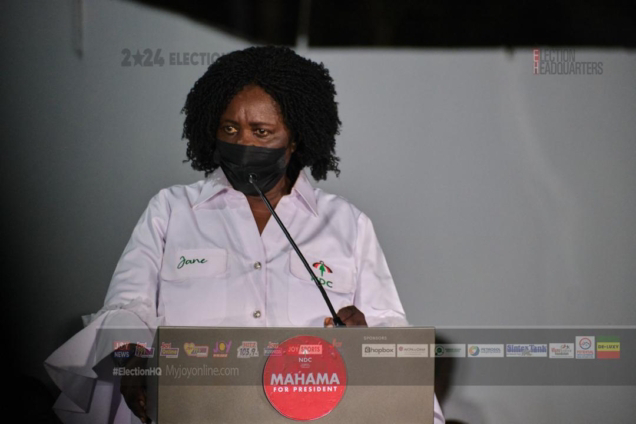In an extraordinary leap for Ghana's democracy and progress, Professor Jane Nana Opoku-Agyeman is on the brink of becoming the nation's first-ever female Vice President. This momentous development heralds a transformative era not only for Ghana but also for Africa as a whole. It is a defining moment for gender equality, political leadership, and inclusive development, especially for the welfare of women and children. As the world watches, Ghana stands poised to rewrite the narrative of women’s leadership, creating a legacy of empowerment, progress, and hope.
This landmark achievement represents a clarion call for change and development, one that resonates beyond the borders of Ghana, signaling a profound shift in how political power and leadership are distributed in Africa’s evolving democracies.
A Game-Changer for Ghana's Democracy
Ghana has long been celebrated as a democratic trailblazer in Africa, with its peaceful elections, transitions of power, and commitment to the rule of law. Yet, the underrepresentation of women in political leadership has remained a glaring gap. The impending appointment of Professor Jane Nana Agyeman as Vice President signifies a seismic shift, addressing a historical imbalance and redefining Ghana's democratic ethos.
Her rise is a testament to the resilience of Ghanaian democracy and its capacity to evolve to reflect the aspirations of its people. It demonstrates a nation ready to embrace diversity, where leadership transcends gender and reflects the dynamism of the citizenry.
For Ghana, this is not merely about breaking a barrier; it is about redefining governance. Her presence in the highest echelons of power ensures that the concerns of women, children, and marginalized groups are integral to the national policy agenda, fostering a democracy that truly serves all its people.
Empowering Women and Children: A New Chapter
The significance of Professor Agyeman’s anticipated vice presidency for women and children cannot be overstated. In a society where women often face systemic barriers, her elevation sends a powerful message: women can lead, and their voices matter in shaping the future of the nation.
This milestone will undoubtedly inspire a generation of young girls to dream bigger, to see themselves as leaders and changemakers. The visibility of a female Vice President offers a tangible example of what is possible, dismantling societal stereotypes and encouraging families and communities to invest in the education and empowerment of girls.
For children, especially girls, this represents a future where their welfare and development take center stage. Policies aimed at improving access to education, healthcare, and economic opportunities for young people are likely to receive greater attention under her leadership.
Professor Agyeman’s tenure is expected to champion initiatives that tackle pressing issues such as gender-based violence, maternal health, and child poverty. Her leadership promises a Ghana where every child, regardless of their background, can access opportunities to thrive.
Women's Empowerment and Political Leadership
Professor Jane Nana Agyeman’s rise symbolizes a pivotal step in the ongoing struggle for gender parity in political leadership. Her impending appointment underscores the importance of recognizing women not as secondary participants but as equal stakeholders in governance.
Ghana has had many female trailblazers in various fields, but the vice presidency is a level of political power no woman has ever occupied in the nation’s history. Her achievement redefines the possibilities for women in politics, setting a precedent for more female participation at all levels of governance.
This is more than a victory for women; it is a victory for Ghana. Studies have consistently shown that societies with greater gender diversity in leadership experience more inclusive policies, sustainable development, and stronger economic growth. With Professor Agyeman at the helm, Ghana has an unprecedented opportunity to harness the full potential of its human resources.
Her leadership also aligns with global calls for gender equality, positioning Ghana as a leader in Africa and an example for nations around the world. It is a moment of pride not only for Ghanaian women but for every woman across the continent striving for recognition and equality.
A Turning Point for National Development
Beyond the symbolism, having a female Vice President is a practical step toward achieving Ghana’s development goals. Professor Agyeman’s expertise and vision promise to bring fresh perspectives to governance, particularly in areas critical to national growth.
Her leadership is likely to focus on education, health, and economic empowerment – sectors where investments yield transformative impacts. For instance, empowering women economically has a multiplier effect, improving household incomes, child welfare, and community development.
Additionally, her anticipated tenure could foster a governance style rooted in empathy, collaboration, and inclusivity, qualities often associated with female leadership. This approach could help bridge divisions, build trust in government institutions, and inspire a collective effort toward national progress.
Broad Implications for Ghana and Africa
The impact of Professor Jane Nana Agyeman’s rise extends far beyond Ghana’s borders. As the first female Vice President in a country considered a democratic model for Africa, her success sets a powerful example for other nations.
It signals to the world that Africa is ready to embrace female leadership at the highest levels, challenging outdated narratives and showcasing the continent's commitment to progress. This milestone could inspire other African countries to prioritise gender equity in governance, fostering a continental movement toward more inclusive leadership.
Her anticipated vice presidency also strengthens Ghana’s position on the global stage. As a nation that values inclusivity and innovation, Ghana will likely attract international partnerships and investments, particularly in areas such as women’s empowerment, education, and social development.
A Clarion Call for Change and Development
Professor Jane Nana Agyeman’s impending appointment is more than a personal achievement; it is a clarion call for change and development. It represents a shift toward a future where leadership is inclusive, governance is equitable, and every citizen has a voice.
For Ghana, this is the beginning of a new chapter – one where women are no longer on the margins of power but are central to shaping the nation’s destiny. It is a call to action for every Ghanaian to support this transformative leadership and ensure that this milestone is the foundation for even greater achievements.
In her, Ghana has not only found a leader but a symbol of progress, a champion for democracy, and an inspiration for generations to come. The nation is ready to chart a new course, one defined by inclusivity, empowerment, and sustainable development – the very foundation of Ghana that its people deserve.
Credit: Ivy Setordjie

